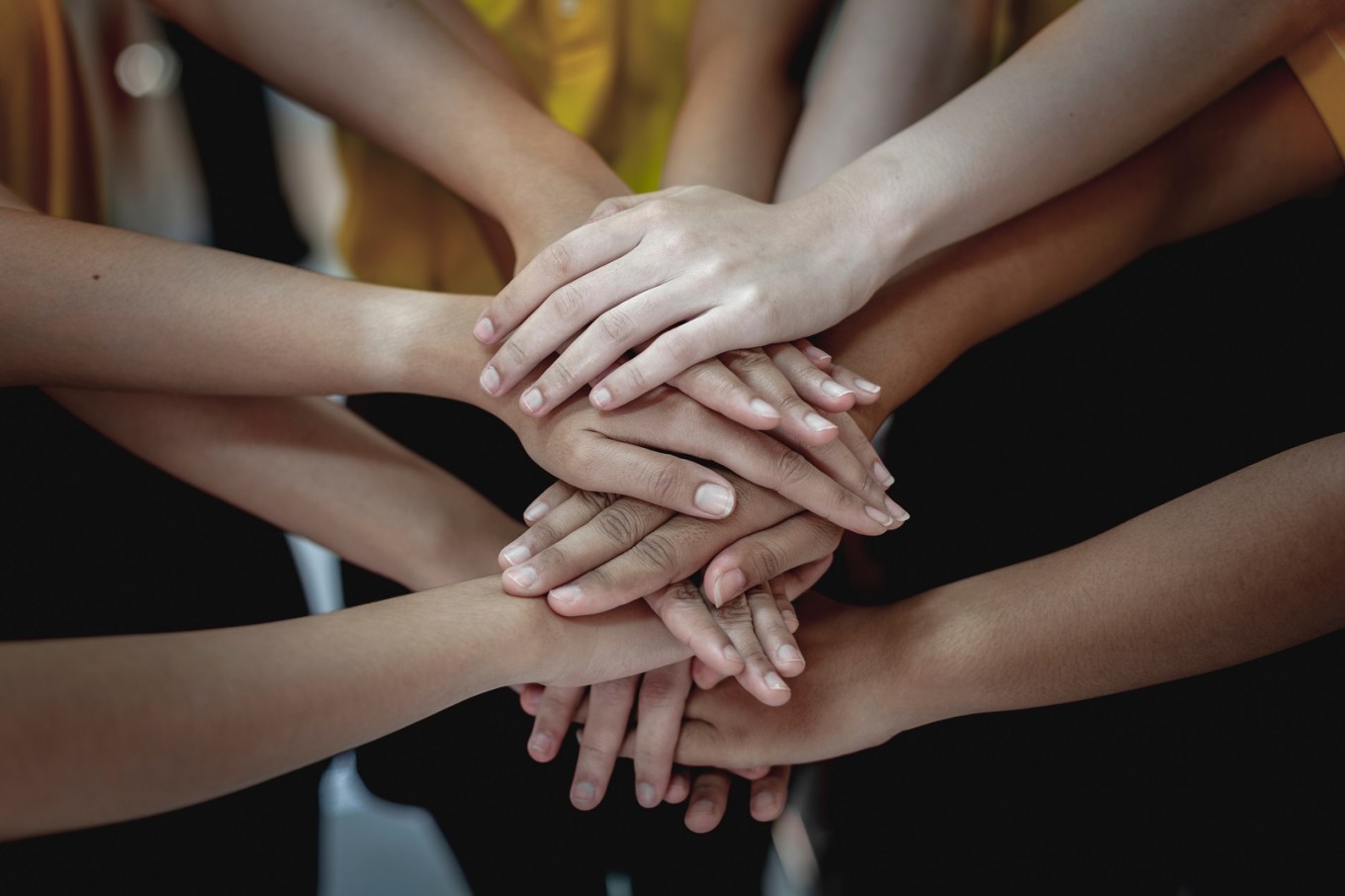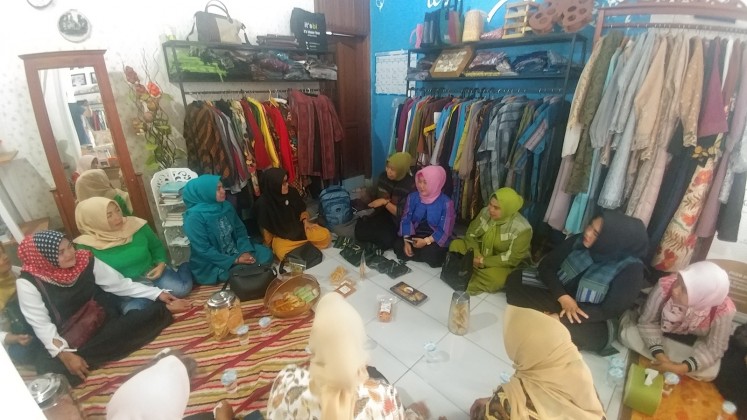Popular Reads
Top Results
Can't find what you're looking for?
View all search resultsPopular Reads
Top Results
Can't find what you're looking for?
View all search resultsIn Bandung, female community spreads message of empowerment, self-reliance
Yanti Lidiati strives to boost the potential of her hometown, Ibun district.
Change text size
Gift Premium Articles
to Anyone
D
ozens of women were sitting on the floor of the It's Blazer Ibun gallery on Jl. Paseh-Kamojang, Ibun district, Bandung regency.
The gallery, which displayed various foods, handicraft and blazers, serves as a showcase area and gathering place for the Wanita Mandiri Ibun (WMI) group.
The place itself is simple. One of the rooms was previously occupied by homeowner Yanti Lidiati, 53, WMI initiator and coordinator. The space now features rows of blazers and shirts that highlight Majalaya sarung designs. On one side of the room, visitors can find rows of traditional snacks for sale, from kembang goyang (flower-shaped crackers) and basreng (fried meatballs) to keripik pisang (banana crackers) and pisang molen (fried banana).
The women from Sudi village in Ibun district visited the place on Dec. 7 for a reason. A day prior, Yuyun had already paid a visit to the gallery.
"Ibu Yuyun offers snacks made by the women of Sudi village. The [variety of] products are aplenty, [however] I refused the offer. I told her to bring the women who made the snacks to meet with WMI members," Yanti told The Jakarta Post at the gallery.
The meeting served as an introduction between Sudi villagers and the women who are members of WMI. Yanti told them right away why she was not interested in purchasing the products brought by Yuyun.
Members of Wanita Mandiri Ibun (WMI) gather at It's Blazer Ibun gallery in Lampegan village, Ibun district, Bandung, on Dec. 7. (JP/Arya Dipa)"If the packages still contain oil, they aren't sellable. I also won't buy them if they were made using non-food coloring and contained preservatives," said Yanti.
She then picked up an oily plastic package of fried spinach. "This snack is rather tough to eat. The food packaging also shouldn't use black plastic. I won't lie; I speak truthfully for your own sake of development," she added.
Yanti strives to improve the potential of her hometown, Ibun district, after abandoning her career at a pharmaceutical company in Jakarta. Following the move, she became active in the An-Nur Community Learning Center founded by her mother that is located right in front her house. From there, Yanti said the development of human resources could not solely depend on formal education.
Read also: ‘Don't let us fight by ourselves’: The women who fight to make Indonesia a safer place
"We must focus on parents, especially mothers," said Yanti, adding that most of the married women with children in Ibun rarely finished junior high school. She thinks mothers should be able to become role models for their children to motivate them to continue and finish their formal education.
"We have to change the mindset. That's why I told them, if they ever need money, come to me. It's easy. Dozens [of these mothers] surprisingly came. I told them that they don't need to borrow money as they are already gifted with huge capital. One of them offered to sell their kidney," said Yanti, reminiscing about her first meeting with WMI members.
The offer to sell a kidney became a discussion topic that led to some of the mothers changing their mindset.” If they still consider themselves poor, they won't go anywhere. That's why I encourage them to do business; I help them [figure out] what they can do, give them input and market their products," Yanti said regarding the background of WMI, which was founded in 2016.
Thirty-seven-year-old Maya Rosmayanti, who lives in Cibeet village, Ibun district, joined WMI through her hobby of sewing.
"Ibu Yanti knows that I like sewing. She then asked me to make her clothes. The first attempt was a failure, [with Yanti commenting] 'what kind of sewing is this?'," Maya shared.
The rejection didn't stop there. "I've cried over it. But thanks to [the encouragement] I became a tailor and my blazers are showcased [at the gallery] and sold abroad," said Maya, who now helps Yanti make blazers from Majalaya sarung and labels them Ït's Blazer Ibun.
Majalaya district is known for its textile factories. During its heyday, more than 400 textile factories could be found there. The number slowly decreased due to the rise of textile imports from China.
"I can only make patterns; I cannot sew. Now we have five tailors helping us. Our popularity grows from word-of-mouth. The selling price also depend on the buyers. We are targeting the middle to upper class with a starting price at Rp 350,000," said Yanti.
Highlighting the concept of self-reliance, Yanti does not pay a salary to the women who sew the blazers. She buys their tailored products. The marketing business is fully handled by WMI, which now receives support from state-owned oil company Pertamina through its corporate social responsibility (CSR) program. The local administration also gives support by inviting the community to participate in various exhibitions.
"Hence, the tailors receive an income according to the amount of blazers they make. One can earn up to Rp 6 million per month. They don’t sew [the blazers] on their own as they receive help from the other members. So in this community, salaries are a reflection of our own hard work," said Yanti, adding that more than 30 women had joined WMI.
Prior to developing fashion products, Yanti also encouraged these mothers to create their own food products.
"Initially, we only made cakes for our own family events to save money. People began to take notice and placed orders with us. After I joined WMI, the variety of products increased to include cookies, pisang molen and other snacks. The community helps me market them as I can't do it on my own," said Susi, one of the members who now employs assistants to help her produce the foods.
To further improve human resources, Yanti encourages the women to continue their formal education by joining the Kejar Paket B, an equivalent of junior high school, and the Paket C senior high school program offered by the An-Nur Community Learning Center.
"This is a gathering place for our big family. It’s not merely about profit. We move forward together and enjoy success together. It's not about how much we own but how much we can help others," said Yanti. (kes)












